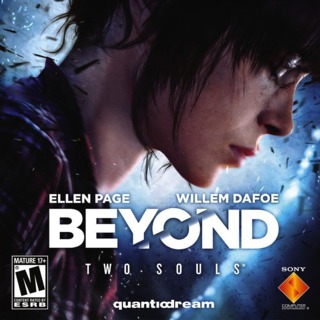PRESENTATION
Beyond: Two Souls, the PS3 exclusive from developer Quantic Dream – notable for Fahrenheit and Heavy Rain – places us in the role of Jodie Holmes, a young woman who has shared a connection with a spiritual entity named Aiden all of her life. Unable to simply live a normal life like other people her age, Jodie is helped along the way by Nathan Dawkins and Cole Freeman, researchers for the Department of Paranormal Activity (DPA). During the game's approximate 10-hour run, the story shows Jodie from a young girl, teenager, adult and back and forth between different scenes of exposition. New characters are introduced and play a part in Jodie's life in different ways. These relationships can develop and disparage depending on dialogue choices made throughout.
The biggest issue with the game as a whole, is the story. It's convoluted and unnecessarily disjointed. The momentary scenes of drama are brought to life through an excellent performance by Ellen Page, who plays Jodie with great emotional depth, lending much-needed impact to most of the story's otherwise simple moments. But the plot gets lost in between the frustrating back-and-forth scenario, and doesn't give the player any chance to take note of important situations. It tackles many different overarching themes that become muddled together as the plot progresses. We go from drama to thriller, action to sci-fi, fantasy to comedy and so on. While some of the script's dialogue is mostly solid, other aspects of it feel forced and predictable. Willem Dafoe also gives a solid performance, though his talent isn't really stretched beyond being Jodie's father figure and shoulder to cry on.
The story switches between different timelines of Jodie's life, and so it often makes no sense at all, and towards the end of the game, becomes too ridiculous for its own good. Add to that some rather confusing scenes (like the Middle East op, or the Navajo sequence) and Beyond feels more and more like a showreel of cool action sequences rather than a coherent and involving story. Despite the shortcomings, Beyond benefits from a surprising plot revelation that is actually really good. That doesn't mean there aren't any good aspects of the story. I enjoyed most of the game's scenes, including the party scene (which can end in a devilishly enjoyable way), the infraworld sequence amidst a destroyed facility, an escape through a rainsoaked town and a sequence where Jodie is homeless. These are the stronger parts of Beyond: Two Souls, and are definitely the stand-out moments where we become more involved into the story as a result.
Aside from the story, the rest of the presentation is top-notch. The graphics are fantastic considering how late into the current-gen we are. Character animations are phenomenal, environments look slick and the art direction is superb. Some of the game's minor details, like rainfall, snow and fire all look amazing, and the atmosphere definitely benefits from these touches as a result. Sound design is also brilliant, with the aforementioned excellent performances aided by equally great voice work and an understated but powerful score by the late Normand Corbeil.
GAMEPLAY
Beyond: Two Souls plays strongly similar to Quantic Dream's last game, Heavy Rain. Jodie is controlled using the left stick (an improvement on Heavy Rain's R2 method) and some scenes utilise R1 (when riding vehicles or fighting). One of the biggest aspects of the game is the use of Aiden. The player can control Aiden to interact with objects, subdue enemies, destroy items of interest and other interactions. Aiden can also embody a character, attaining control of that character, who is used for killing enemies (or themselves) and enabling access to areas that are otherwise blocked.
The issue with Aiden is that his ability doesn't go anywhere. Aside from interacting with static objects and enemies, Quantic Dream definitely missed opportunities with this feature. There is no puzzle solving, no cool secrets to find while using him (aside from some very hard-to-see clues that unlock concept art) and no ways to cause mayhem (for the deviant players). The war sequences involving gunplay are also underwhelming, as is the combat. Different from Heavy Rain, the game implements a system where left and right stick movements are used to hit an enemy in which direction was pressed. The combat has other movements like ducking, jumping and crouching, but none of it feels interesting, and feels awkward. The QTE sequences are still present, and they work well enough, however.
REPLAYABILITY
Beyond: Two Souls runs at around ten hours on the first playthrough and, although there are multiple endings, playing through again is difficult due to the poor story and uninteresting gameplay. If you do manage to get through it again, you'll witness different endings depending on choices made, including a rather surprising (and admittedly cool) twist, which explains the plot in a new light.
Despite the many shortcomings, I enjoyed Beyond: Two Souls enough to recommend a playthrough. The performances are great, the visuals are fantastic and some of the game's scenes are interesting. The story is disappointing, Aiden's abilities miss the mark and the gameplay doesn't grab the play unlike Quantic Dream's previous efforts, but it is still something you don't see very often in games.
SUMMARY
Presentation 7.0
Gameplay 7.5
Replayability 7.0
Overall – 7/10

